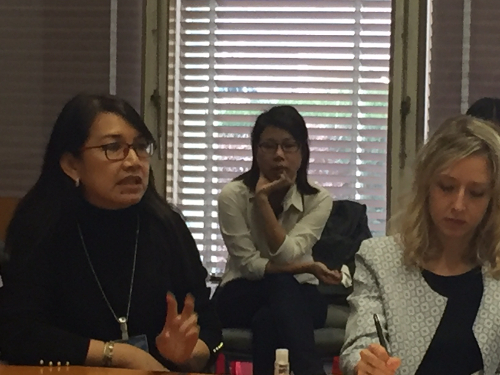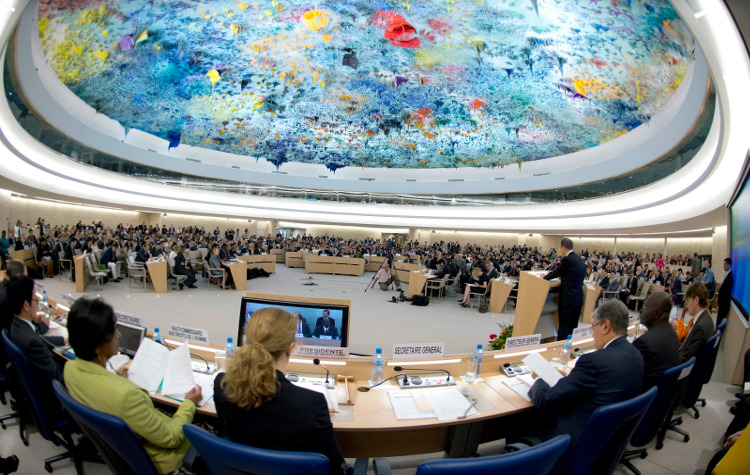FORUM-ASIA organised a consultation between Asian human rights defenders and the UN Special Rapporteurs on human rights defenders; freedom of peaceful assembly and of association; and freedom of religion or belief, with the participation of international NGOs that work on similar issues. The consultation took place in Geneva, Switzerland, on 09 March 2017, at the same time as the 34th session of the UN Human Rights Council, and was moderated by John Samuel, FORUM-ASIA Executive Director.

The consultation began with an overview of the situation of human rights defenders in Asia, as discussed by Shahzad Ahmed of Bytes for All, Pakistan. While citizen journalists and bloggers in the region have been effective at initiating positive change in their countries, their work has been restricted by blasphemy laws, particularly targeting online spaces; crackdowns on civil society space by state authorities; harassment of women human rights defenders and defenders from religious and sexual minorities; and impunity for actions of vigilante actors. Far right groups on social media fuelling intolerance and extremist ideologies, and cyber armies and government-sponsored trolls are also recurring trends in the region.
Country-specific situations, particularly in Bangladesh, Burma/Myanmar, and Pakistan were then discussed.
Ahmedur Rashid Chowdhury (Tutul) discussed threats and attacks against bloggers and online activists in Bangladesh, particularly those who express secular or progressive views. In spite of this, he continues to exercise his freedom of expression online to inspire younger generations to be freethinkers.
Khin Ohmar of Progressive Voice stressed the need to recognise issues related to rising nationalism in Burma/Myanmar due to government policies and practices that discriminate against ethnic minorities. The military has been targeting voices of dissent, particularly Muslims, and arbitrary arrests are increasing.

Waqass Goraya discussed the abduction and torture of bloggers, and the worsening clampdown on civil space, particularly online, in Pakistan. There has been a case filed against him and his colleagues on the grounds of blasphemy.

Thematic issues related to human rights defenders and fundamental freedoms were also discussed by international NGOs.
Arvind Narrain of ARC International discussed restrictions on LGBTI human rights defenders online. He stressed that the 2016 resolution on the promotion, protection and enjoyment of human rights on the Internet, stipulates that the same rights enjoyed offline must also be protected online. The Internet is a crucial platform to discuss questions of identity, making it of particular importance to the LGBTI community. When considering the freedom of association, the dimension of intimate association should also be considered and given importance.
Pooja Patel of the International Service for Human Rights (ISHR) emphasised that the online and offline harassment of women human rights defenders should not be considered separately. The documentation of incidents of harassment against women human rights defenders should provide a clear analysis of the context and gendered nature of the attacks.
Andrew Smith of Article 19 spoke of threats to freedom of expression, particularly hate speech and incitement to violence. He stressed the need to look at the connection between hate speech and gaps in legal standards. On blasphemy, he discussed issues related to Human Rights Council resolution 16/18 on ‘ addressing religious intolerance through promoting the interrelated and mutually reinforcing rights to freedom of expression, freedom of religion or belief, and non-discrimination’.

The Special Rapporteurs discussed global trends identified by their mandates and opportunities for working more closely with human rights defenders.
Michel Forst, Special Rapporteur on the situation of human rights defenders, said that many states have equated people who work on human rights with terrorists and troublemakers, and accused them of using the Internet to promote Western values. He emphasised the need to stick to the definition of human rights defenders enshrined in the UN Declaration on Human Rights Defenders. He called on civil society to provide him with additional information on risks faced by human rights defenders who are active online, as well as called for a discussion on how to make more effective use of existing tools and technology.

Ahmed Shaheed, Special Rapporteur on the freedom of religion or belief, expressed his concerns on the rising tide of intolerance. A violation of freedom of religion or belief results in the violation of a number of related rights, and in order for freedom of religion or belief to be effectively realised, other related rights must also be safeguarded. He called for the effective use of the Universal Periodic Review (UPR) for lobbying on the ground and reaffirmed his commitment to advocate for victims of rights violations.

Maina Kiai, UN Special Rapporteur on the rights to freedom of peaceful assembly and of association underlined that the election of Trump in the U.S. has given confidence to far right fascists, autocrats, and those are intolerant around the world, with those exclusionary getting power in places like Burma, Pakistan, and the Philippines. He asked the question: “If the world is different now, isn’t it time to also change the ways we do things?” He also mentioned similar issues with the regimes in Cambodia, India, Malaysia, the Maldives, and Thailand. He stated the need to address root causes, instead of symptoms, as well as saving human rights defenders. He called on civil society organisations to continue to engage Special Rapporteurs, as well as find ways for them to get invitations and access to country visits.

In wrapping up the session, John Samuel emphasised the need to come up with new strategies to deal with current issues on fundamental freedoms online and offline. Firstly, on the conceptual level, there is a need to build a narrative on how to engage in the right perspective. Secondly, strategies need to be developed on how to protect people on the ground. Thirdly, the question of what kind of advocacy is needed on the international level needs to be addressed. Lastly, he suggested establishing a working group at national, regional and international levels that would also address preventive mechanisms.



